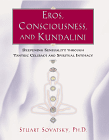
A broken romance, a penchant to be different, a tiredness of the sexual merry-go-round, a search for something deeper, curiosity, fate -- what brings a person to consider celibacy for a few months or years cannot be easily explained. In erotic actions, we enter a mystery, and often we only discover afterward the real reasons we got involved.
If you decide to try tantric sublimation, I recommend you set a minimum duration of three months. It will take some time for you to live yourself into the choice that you have made and to reap the results of greater tolerance for sexual feelings without needing to act on them in conventional ways. During these first months, the yoga practices will be opening channels in your body to facilitate the sublimation process, giving you a basis for celibate erotic fulfillments. Sex will become more of a choice than a need after this degree of opening has been achieved.
You may or may not find a great deal of anxiety in setting the duration of your practice. Should a period of more than a few months shock you, I would advise you to think again about what you want and what you believe about your sexual situation. Brahmacharya is more than a weekend workshop. It requires a sincere and devoted application of oneself to develop its potentials.
When To Stop?
My first commitment was for fifteen months. After that, I stopped counting and thus added another dimension to my practice, an almost frightening sense of freedom. Before I reached that point, however, I saw more subtle, ambivalent feelings taking the form of the thought "When is this going to be over!" At this point, I feel I must raise a question for you to consider: If you really start to enjoy tantric sublimation, on what basis would you decide to stop?
You might insist that you'll know exactly when to return to conventional sex. Ramakrishna, an Indian saint who went deeply into the practice of brahmacharya, described his experience as "one in which it seemed that all the pores of the skin were like female organs and intercourse was taking place over the whole body". Such experiences, which may emerge only after years of development, can make the decision to stop or continue far more thought-provoking than you might imagine.
Not setting a specific duration can help make your practice less self-conscious and studied. You might even begin to feel a sense of freedom in having no predetermined limit. On the other hand, if you have trouble establishing yourself in your commitment, a preset duration could give you support to pull yourself through the first months of practice and uncertainty. You need some time to reorient yourself within the everyday world of sexual attraction from the tantric perspective.
What Is Your Motive?
Another formidable consideration is how tantric sublimation fits into the idiosyncracies of your personality. Are you a perfectionist, expecting to get it right the very first time and more and more right as you go along? Or are you spiritually competitive and think sublimation will make you "more" spiritual than others? Are you from an older school of sex and feel that celibacy is a proper way to restrain waywardness? Do you tend to go to extremes, expecting to swing from sublimation to utter sexual abandon? Perhaps you consider yourself overly dependent and feel you might be doing this to win someone's approval. Another possibility is that you may be angry at someone and want to inflict your celibacy on them as a revenge.
As you might guess, all such motivations can severely narrow your experience of sublimation, at least initially. As you progress, however, more positive motivations based in your new experiences might arise.
Consider whether you might not be trying to avoid the challenges of social interaction by going celibate. Not only is such uneven growth unsatisfying; the high degree of intimacy that tantric sublimation works toward will not allow it.
If you intend to practice with a partner, observe the manner in which any problems you ordinarily have while talking about sex emerge during your conversations on trying celibacy. Notice which partner wants to practice it more, who acts as though he or she knows more about it, who is taking it more seriously, and so forth. By returning to the foundation of eros-as-mystery, you will be aided in dislodging yourself from these hierarchical and polarizing dynamics.
Finally, you may be concerned about AIDS, problematic relationships, being rejected or getting committed, or sexual performance. It is important that you be as honest as you can about such concerns as you set out on your celibate path. Your tantric practice might even help resolve some of these nagging worries of the ego-mind as you discover moments of the self-acceptance known as "the peace that passeth all understanding".
Why You Might Choose Brahmacharya
1) You are going to be involved in a project for some time, and you think tantric sublimation will help you to focus your time and energy.
Celibacy has long been part of certain traditional lifestyles of service and personal development. Mother Teresa, Mahatma Gandhi, and United Nations Secretary General Dag Hammarskjold are three well-known exemplars of chosen celibacy as a support to work and service. It was her doctoral research on creativity that led Gabrielle Brown, author of The New Celibacy, to draw a correlation between unusually creative people and celibacy.
Meditation becomes particularly useful in conjunction with brahmacharya for a creative project. When the mind becomes still in meditation, currents of energy begin to flow up through very subtle pathways, invigorating consciousness. As you return to thinking about your project, new lively ideas may emerge, so you might want to keep a pad and pencil near your meditation cushion -- but not so near as to distract you.
The principles of karma yoga, the yoga of life activities, might be particularly relevant to a celibacy that serves a creative project or activity: to enjoy the process of your work at each step, rather than focusing too much on the gratification of completion.
2) You are feeling seclusive.
As one of my teachers used to say, brahmacharya is discovering the love in yourself that you usually reserve for falling in love with someone else. He claimed it was an ideal preparation for a relationship or a satisfying lifestyle in itself, based on discovering one's inner source of happiness.
Meditative peace is itself an inner form of being alone, for we are free of that crowd of chattering thoughts that can endlessly distract us. Such inner quiet holds the possibility of discovering a profound paradox: We are each singularly alone in the world, yet, in this undistracted silence, we feel even more intimately related to one another and to the world. If you are single, you might choose to use your personal time to practice three or four hours of yoga almost daily, while maintaining your other involvements. For some single brahmacharins, sadhana might become "the love of your life" -- at least for the months or years of your practice.
3) You have a sexually communicable disease, and you want safe ways to express love, passion, and affection.
AIDS, herpes, chlamydia, and other sexually transmitted diseases are demarcating the limits of a territory that earlier sexologists depicted as an idyllic paradise. You might be feeling unjustly backed into this seemingly claustrophobic corner of "no sex" for longer than you expected. Tantric sublimation will reveal many alluring gateways out of that boxed-in place.
4) You want to develop nonsexual friendships, and you are being more selective these days.
We are used to seeing one another either as possible sexual partners or as "just friends" (that is, "There is no way I could be turned on to you!"). An inner yes/no switch automatically catalogs everyone we see as sexually desirable or undesirable. In tantric sublimation, we can operate beyond this binary narrowness via the unprepared openness of "nonattachment".
Though nonattachment may sound austere, it simply refers to an experience of intimacy without agendas. We learn to see others without appropriating or grasping at them for some personal end. Our friendships with the other gender often take on a freeing and relaxed intimacy when the expectation of sex has been put aside.
5) You want to develop a deepening sense of intimacy with your partner.
Intimacy is a matter of one person being moved by another. The rustle of her robe, the shyness of his gratitude, the heat of her disappointment, the bitterness of his losses, even possessions can be mediums through which we are moved by one another. For it is not the "things" that move us but the way our love brings them to life with the individuality of the beloved. In Saint Exupery's The Little Prince, the fox speaks of such intimacy, which he calls "taming":
"If you tame me, it will be as if the sun came to shine in my life. I shall know the sound of a step that will be different from all others.... And then look: you see the grain-fields down yonder? I do not eat bread. Wheat is of no use to me. The wheat fields have nothing to say to me. And that is sad. But you have hair that is the color of gold. Think how wonderful that will be when you have tamed me! The grain, which is golden, will bring me back the thought of you. And I shall love to listen to the wind in the wheat...."
The fox gazed at the little prince, for a long time. "Please -- tame me!" he said.
So often, however, the impatient desire for more intimacy is what obscures the subtle phenomena of intimacy presently alive, as, sadly, the little prince responded to his fox:
"I want to (tame you), very much," the little prince replied. "But I have not much time. I have friends to discover, and a great many things to understand."
To which the fox responded in parting:
"And now here is my secret, a very simple secret: It is only with the heart that one can see rightly; what is essential is invisible to the eye."
The art of seeing with one's heart is what tantric sublimation is all about.
6) You are troubled by the difficulties in love relationships and wonder how tantric sublimation and psychology might help.
If you are not currently in a love relationship, the practice of solitary sublimation can give your life a satisfying fullness of emotionality, commitment, and passion typically thought available only to coupled people. Thus, your longings for a partner can be freed of the desperation that being alone sometimes breeds. Instead, should you meet someone you are truly interested in, your longings will have a welcoming freshness.
Since tantric sublimation is a transformative art, its approach to difficult emotions is far more paradoxical and poetic than most conventional and popular psychologies of love. Instead of a vocabulary of semidiagnostic terms, like codependency, emotional wounding, or fears of abandonment and commitment, tantric terms like viyoga -- the union that lives in even the most painful struggles -- grasp the ambiguity inherent in erotic difficulties.
Thus, you will learn about the hidden rectifying powers within apology and forgiveness, how to miss someone romantically instead of thinking of yourself as abandoned, how to protect "the awe of great possibilities" from being misinterpreted as fears of commitment. Fear and awe are close cousins in erotic matters, and it is an ironic tragedy that the same awesomeness that inspires feelings of total possibilities in the beginning of love and family life will claustrophobically close down possibilities when misunderstood as fear.
In this more intimate world, we encounter the paradoxical and lesser-known erotic passions of joys that seem too good to be true, of being ourselves more than we ever thought, even as we awaken to other possibilities that seem too tragic to be endured. We uncover the too common irony that sometimes it becomes easier to fight over personality issues and mundane problems than to get all choked up with one's gratitude. We spare each other our gratitudes, for the ensuing intimacy is more than we can readily bear.
7) You wonder if your marriage can be enhanced in certain ways by a period of celibacy.
Marriage exists because we need the time of a lifetime to bring forth more completely the deeply hidden potentialities that begin to emerge when people are in love with each other. Commitment is merely the natural and immediate response to perceived, yet hidden, possibilities. Commitment is the sustained and suspenseful allurement of mystery.
For example, newlyweds will argue over the color to paint a certain room to camouflage the awesome and perhaps unbelievable experience of knowing and feeling that they are actually creating a home in which they will live, share, create life, and die. In tantra, money problems, household chores, and parenting responsibilities must all be placed in a larger context of living. For older couples, the tantric perspective can reveal a long-developing passion that attains its climax only after a lifetime of sharing.
Phyllis, fifty-eight, and Jason, sixty-two, have been married for thirty years. Their lives have been busy with dual careers and family life. "Too busy for a mid-life crisis," says Jason. Yes, they have been committed to each other for over thirty years, but their commitment has been to expectations, and their satisfaction has been in attaining them. Uncertainty was something to allay with plans and success and has never been a gateway to the trepid and alluring awe of the unknown future. Since they are "almost celibate", they turn to the philosophy and practice of tantric sublimation. During their newly learned eye-contact meditations, they share their amazement at what now comes out of hiding from behind the daily routines of thirty years: They are giving each other their lives and receiving the same as well.
In uncovering erotic rhythms longer than sex-desire, tantra reveals an organic basis for lifelong monogamy known as "the householder's path", commitment allured onward by the fullness of a lifetime.
8) You find the various artificial methods of contraception to be undesirable, and you wonder if there are "other ways" to make love.
When Wilhelm Reich was formulating his basic principles of sexual liberation for fertile heterosexuals, he concluded that, since sex was necessary thrice weekly, contraception was "absolutely necessary for sexual health". Within the conventional biological model of sex, this may be true. Yet this solution is not as utopian as Reich and the rest of us had hoped -- as our abortion rates and problems with contraception can attest.
Kristin Luker's abortion research in Taking Chances concluded that unintended pregnancies weren't best explained as "contraceptive failures" but as a kind of sexually enflamed willingness to "take a chance, just this once". Fertility just slips slyly through the cracks of sex, not through our irresponsibility but because of the exhilarating power of erotic mystery.
Contraception, unintended pregnancy, and abortion, and the debates surrounding them, are rendered obsolete for the tantric celibate. Conceptions, when they occur, are always sought rather than being varyingly regretted side effects of sexual intercourse. And, as R. D. Laing (1970) noted in reference to the significance of being a welcomed conception, "The difference between being welcome and unwelcome... is all the difference in the world".
Furthermore, if we had intercourse only when we were hoping to conceive, we might recover the actual experience of procreation. Rob, forty, describes his surprise of "discovering" that sex is also the procreative process:
After several years of tantric celibacy, it was easy to feel the procreative aspect of sex. When we did conceive, it was one of the most profound experiences of my life. I had lost all my sexual associations with the act of intercourse, and all that I was aware of were the sensations of conceiving this unique, new human being with my wife.
On one hand I was amazed -- this is a miracle! On the other hand I felt convinced -- so this is what sex is about. I could see why some religions have tried to keep sex just for reproduction, although I doubt they had this sort of experience in mind. It felt so real, so meaningful, that it has changed my understanding of what human life is all about, of how much spiritual power we have as human beings.
The sublimative way of erotic expression could also be particularly useful to teenagers, whose sexual curiosity forever outsmarts even the most well-schooled efforts of our sex/contraception education. Originally, the term brahmacharya referred to preadolescence through young adulthood, when, in the wake of genital puberty, we learn and grow at a rapid pace. An open-minded teenager might find brahmacharya very fulfilling, rather than being one more nagging parental injunction against which to rebel.
9) You have been celibate for some time now, and you are wondering what might be going on in you as a result.
Having a vocabulary to apply to your celibate experiences can be most helpful, especially in a culture where celibacy is generally understood as an absence of experiences. Yoga gives you a detailed mapping of the subtle physiology of sublimation that grounds its processes and unique arousals in the body. The many physical and meditative practices help you to derive the greatest benefits from your celibate time.
If you have been celibate for some time, the mere publication of this book (Eros, Consciousness, and Kundalini) may be important to you. I remember that in my third year of practice I could readily identify with many of the pains common to any minority -- sexual or otherwise. People might not accept a person's being gay, but they now at least admit that homosexuality exists. Most people don't think that a viable sublimation can exist, which can be a uniquely difficult social pressure to be exposed to.
10) You wonder why celibacy and spirituality are stereotypical bedfellows; you wonder in general about the spiritual significance of sex and tantric celibacy.
Throughout history, many people have become celibate spontaneously, not as a cultivated practice to become a better, happier person or couple but as a consequence of self-realization. If you are always feeling love, then you always feel as though you are making love. Sex becomes rather redundant.
Tantric sublimation begins with the feelings a person currently experiences and helps trace them toward greater subtlety. At some point, even the subtlest feelings come to an absolute limit, and one will need a leap of faith into the spiritual aspects of human life, a leap into unverifiable truths that our faith knows to be true anyway. There one is awed by how endlessly real God is and how refinedly innocent are all the passions of innocence. This unparalleled awe has, for thousands of years, remained the spiritual possibility of which brahmacharya is only an outward sign.
Reprinted with permission of the publisher,
Inner Traditions International. ©1999. www.innertraditions.com.
Article Source
Eros, Consciousness, and Kundalini: Deepening Sensuality through Tantric Celibacy and Spiritual Intimacy
by Stuart Sovatsky, Ph.D.
 In this extraordinary celebration of the erotic, Dr. Stuart Sovatsky introduces us to the Tantric art of sexual sublimation, in which sexual energy is redirected toward achieving higher awareness and an erotic satisfaction far beyond that possible through sexual intercourse. The potential reasons for exploring Tantric celibacy are many--including the desire to deepen a life partnership, to gain a new level of mastery over one's body, to heal the emotional scars of sexual abuse, to practice safe sex, or to explore the intimate relationship between spirituality and sexuality.
In this extraordinary celebration of the erotic, Dr. Stuart Sovatsky introduces us to the Tantric art of sexual sublimation, in which sexual energy is redirected toward achieving higher awareness and an erotic satisfaction far beyond that possible through sexual intercourse. The potential reasons for exploring Tantric celibacy are many--including the desire to deepen a life partnership, to gain a new level of mastery over one's body, to heal the emotional scars of sexual abuse, to practice safe sex, or to explore the intimate relationship between spirituality and sexuality.
For more info or to purchase this book.
Newer edition of the above book: Advanced Spiritual Intimacy: The Yoga of Deep Tantric Sensuality (paperback and Kindle edition)
About The Author
 STUART SOVATSKY, PH.D., has been a practitioner of kundalini yoga for twenty-four years and is the director of two psychotherapy clinics in the San Francisco Bay Area. A former presenter at the World Congress on Sexology in India and the International Kundalini Research Network, he teaches at JFK University and the California Institute of Integral Studies. You can contact the author at
STUART SOVATSKY, PH.D., has been a practitioner of kundalini yoga for twenty-four years and is the director of two psychotherapy clinics in the San Francisco Bay Area. A former presenter at the World Congress on Sexology in India and the International Kundalini Research Network, he teaches at JFK University and the California Institute of Integral Studies. You can contact the author at
Related Books
at InnerSelf Market and Amazon


























